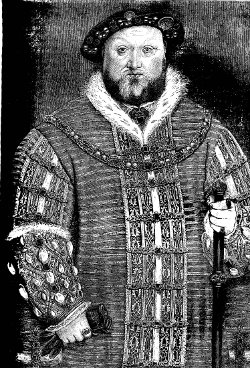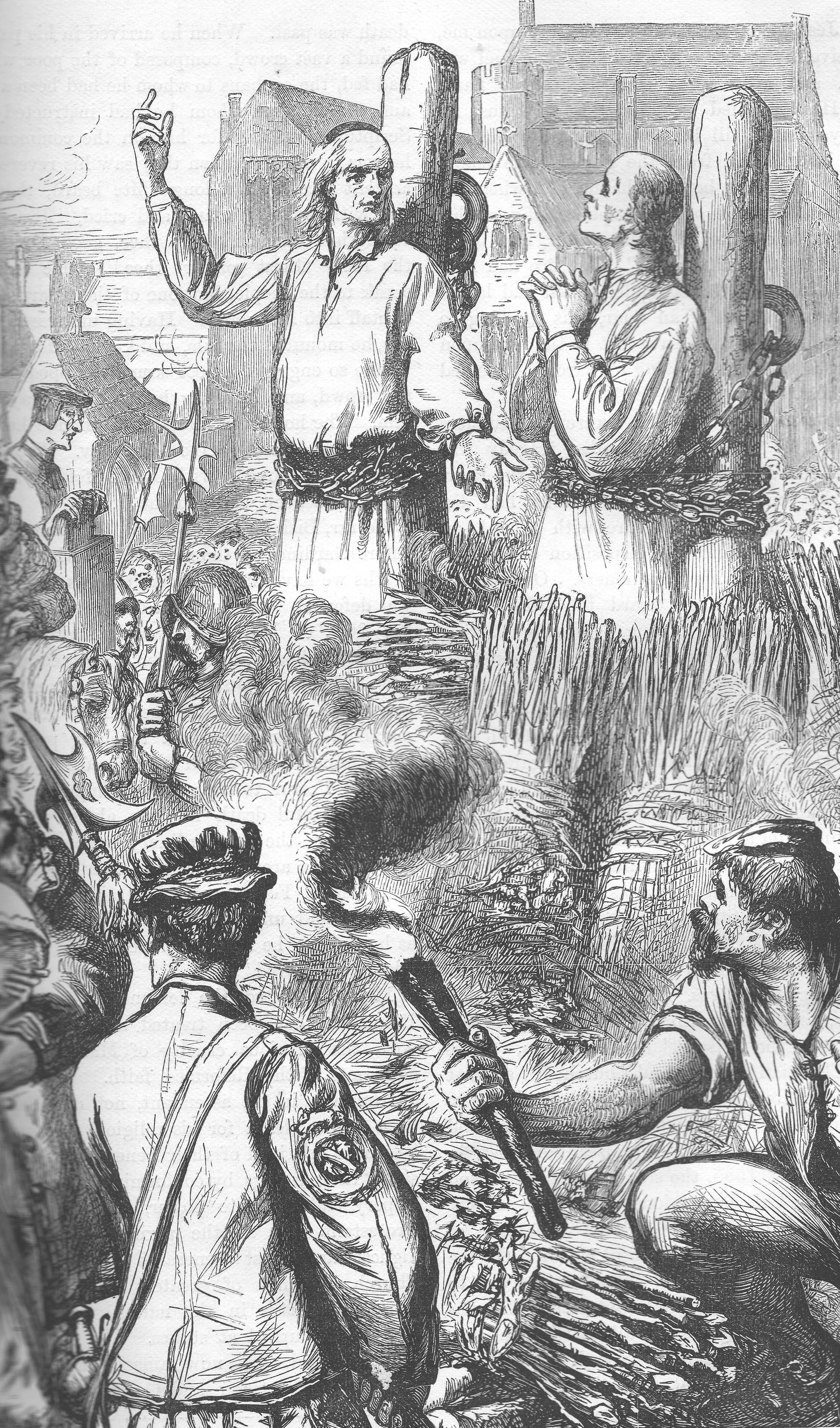Spurgeon's
Eccentric Preachers
Part 2 –Hugh Latimer. 1480 – 1555
Popish historians have not hesitated to describe Latimer as extremely eccentric. Lingard says, “His eloquence was bold and vehement, but poured forth in course and sarcastic language, and seasoned with quaint low jests and buffoonery.” This accusation is evidently made for the purpose of whitewashing Popery and blackening the Reformation. It is with pleasure that we read it, because it enables us to enrol the bishop amongst the noble army of the slandered servants of God. We have no wish to deny that Latimer was exceedingly quaint, and intermingled with flashes of pleasantry with his earnest exhortations and serious arguments; but it was always with the view of confounding error and reaching the hearts of his hearers.
Here is an example of his shrewdness. Dr. Buckingham, one of the Black Friars, undertook to confute Latimer, and in his sermon said among other remarkably wise things that the reading of the Scriptures in the vulgar tongue would cause people to leave their vocations, and run into all sorts of extremes. “Thus,” said he, “for example, the ploughman when he heareth this in the gospel, 'no man that layeth his hand on the plough and looketh back is meet for the kingdom of God,' will peradventure upon this cease from his ploughing. Likewise the baker, when he heareth that 'a little leven corrupteth the whole lump of dough' may perchance leave our bread unleavened, and so our bodies be unseasoned.” Latimer heard this sermon, and engaged to answer the arguments, which he did from the same pulpit in the afternoon, Dr. Buckingham sitting opposite him with his Blackfriars cowl upon his shoulders. After discoursing upon the figurative phrases of Scripture, Latimer said that such metaphors were in all languages, “as for example,” observed he, looking towards the place where the friar sat, “when the painters represent a fox preaching out of a friar's cowl, no one is so weak as to take this for a real fox, but only as a figure of caution to beware of the hyprocisy, craft, and dissimulation which lie hid many times under those cowls.”
The general preaching of Latimer before and after he became a bishop was very plain and homely, and exactly suited to the manners and tastes of the people to whom he spoke. His sermons should be read by every lover of racy English. We have only space for one extract, which will show how very plain and colloquial he could be. “A good fellow on a time had another of his friends to a breakfast, and said, If you will come, you shall be welcome; but I tell you aforehand, you shall have but slender fare, one dish and that is all. What is that? Said he. A pudding, and nothing else. Marry (said he), you cannot please me better; of all meats, this is for mine own tooth; you may draw me round about the town with a pudding. These bribing magistrates and judges follow gifts faster than the fellow would follow the pudding.” Latimer wanted his words to be remembered so as to work reform and he did well to put them in such a shape that they would ring over the land. We will warrant that this pudding story of his did more for justice than a dozen refined orations. His was practical preaching and it dwelt with the sins of the great as well as with those of the common people in tones too honest to be very polite.

The dauntless courage of this noble servant of God was seen in his conduct towards Henry VIII. One new year's day instead of carrying, according to the custom of that age, a rich gift to the king, he presented him with the New Testament, a leaf of which was turned down at this passage. “Whoremongers and adulterers God will judge.” This might have cost him his life; but Bluff Hal, instead of being angry, admired the good man's courage. Upon a certain occasion, when preaching before Henry, Hugh, as was his wont, spake his mind very plainly, and the sermon displeased his majesty; he was therefore commanded to preach again on the next Sabbath, and  to make an apology for the offence he had given. After reading his text, the bishop thus began his sermon: - “Hugh Latimer, dost thou know before whom thou art this day to speak? To the high and mighty monarch, the king's most excellent majesty, who can take away thy life if thou offendest; therefore take heed that thou speakest not a word that may displease! But then consider well, Hugh, dost thou not know from whence thou comest; upon whose message thou art sent? Even by the great and mighty God! Who is all present! And who is able to cast thy soul into hell! Therefore, take care that thou deliverest thy message faithfully.” He then proceeded with the same sermon he had preached the preceding Sabbath, but with considerably more energy. The same sermon ended, the court were full of expectation to know what would be the fate of his honest and plain-dealing bishop. After dinner, the king called for Latimer, and with a stern countenance asked him how he durst preach in such a manner. He falling on his knees, replied, his duty to his God and his prince had enforced him thereto, and that he had merely discharged his duty and cleared his conscience by what he had spoken. Upon which the king rising from his seat, and taking the good man by the hand embraced him, saying, “Blessed by God, I have so honest a servant.”
to make an apology for the offence he had given. After reading his text, the bishop thus began his sermon: - “Hugh Latimer, dost thou know before whom thou art this day to speak? To the high and mighty monarch, the king's most excellent majesty, who can take away thy life if thou offendest; therefore take heed that thou speakest not a word that may displease! But then consider well, Hugh, dost thou not know from whence thou comest; upon whose message thou art sent? Even by the great and mighty God! Who is all present! And who is able to cast thy soul into hell! Therefore, take care that thou deliverest thy message faithfully.” He then proceeded with the same sermon he had preached the preceding Sabbath, but with considerably more energy. The same sermon ended, the court were full of expectation to know what would be the fate of his honest and plain-dealing bishop. After dinner, the king called for Latimer, and with a stern countenance asked him how he durst preach in such a manner. He falling on his knees, replied, his duty to his God and his prince had enforced him thereto, and that he had merely discharged his duty and cleared his conscience by what he had spoken. Upon which the king rising from his seat, and taking the good man by the hand embraced him, saying, “Blessed by God, I have so honest a servant.”
Under Edward VI Latimer had great influence, but the return of Mary soon called him to severer conflicts. Dauntless, honest, and simple-hearted, Latimer rejoiced when he was called upon to lay down his bishopric; and when he was summoned to be tried for his life the old man hesitated not to appear and defend our holy faith to the death. His words at the stake were characteristic of the man. Addressing Bishop Ridley, who was to die with him, he said, “Be of good comfort, Master Ridley, and play the man. We shall this day light such a candle by God's grace in England as I trust shall never be put out.” And by God's grace it never shall be.
(Note — Bluff Hal was a nickname given to Henry V111)



 to make an apology for the offence he had given. After reading his text, the bishop thus began his sermon: - “Hugh Latimer, dost thou know before whom thou art this day to speak? To the high and mighty monarch, the king's most excellent majesty, who can take away thy life if thou offendest; therefore take heed that thou speakest not a word that may displease! But then consider well, Hugh, dost thou not know from whence thou comest; upon whose message thou art sent? Even by the great and mighty God! Who is all present! And who is able to cast thy soul into hell! Therefore, take care that thou deliverest thy message faithfully.” He then proceeded with the same sermon he had preached the preceding Sabbath, but with considerably more energy. The same sermon ended, the court were full of expectation to know what would be the fate of his honest and plain-dealing bishop. After dinner, the king called for Latimer, and with a stern countenance asked him how he durst preach in such a manner. He falling on his knees, replied, his duty to his God and his prince had enforced him thereto, and that he had merely discharged his duty and cleared his conscience by what he had spoken. Upon which the king rising from his seat, and taking the good man by the hand embraced him, saying, “Blessed by God, I have so honest a servant.”
to make an apology for the offence he had given. After reading his text, the bishop thus began his sermon: - “Hugh Latimer, dost thou know before whom thou art this day to speak? To the high and mighty monarch, the king's most excellent majesty, who can take away thy life if thou offendest; therefore take heed that thou speakest not a word that may displease! But then consider well, Hugh, dost thou not know from whence thou comest; upon whose message thou art sent? Even by the great and mighty God! Who is all present! And who is able to cast thy soul into hell! Therefore, take care that thou deliverest thy message faithfully.” He then proceeded with the same sermon he had preached the preceding Sabbath, but with considerably more energy. The same sermon ended, the court were full of expectation to know what would be the fate of his honest and plain-dealing bishop. After dinner, the king called for Latimer, and with a stern countenance asked him how he durst preach in such a manner. He falling on his knees, replied, his duty to his God and his prince had enforced him thereto, and that he had merely discharged his duty and cleared his conscience by what he had spoken. Upon which the king rising from his seat, and taking the good man by the hand embraced him, saying, “Blessed by God, I have so honest a servant.”
